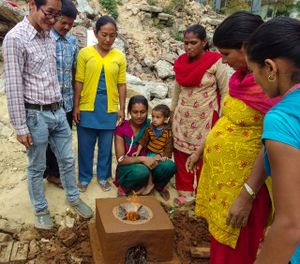Click here to register!
Production, Installation and Maintenance of Improved Cookstoves by Women in Nepal
Overview
As part of ENERGIA’s Women’s Economic Empowerment Programme, Centre for Rural Technology – Nepal (CRT/N) is implementing the Promoting Women-led Enterprises for Energy Access and Local Production project (WEE-Nepal). In collaboration with other organisations, CRT/N trains and supports women to be energy-based micro entrepreneurs.
Here’s how it works: Women get the skills they need to construct and sell cookstoves themselves and are connected to manufacturers to ensure access to the products they need to feed market demand for improved cookstoves. Not only do women learn how to install and maintain the cookstoves, but they learn how to grow their businesses through investments, marketing, education, quality control and contact with their local communities. In addition, other female entrepreneurs in this program are improving their businesses through better use of energy and other inputs, such as skills training on business and marketing.
From Social Worker to Improved Cookstoves Supplier
Bal Kumari Magar, a respected social worker in the Mahadevdanda Village Development Committee of Nepal’s Sindhuli district, learned how to operate and sell improved cookstoves through WEE-Nepal in April 2015. Since then, she has been active in her community, installing more than 135 fixed mud stoves and supplying more than 90 units of portable steel rocket stoves, which require less fuel than traditional cookstoves. She gets a commission on every rocket stove she sells, as she developed a business relationship with the rocket-stove supplier. So far, her work as an improved cookstove entrepreneur has earned her up to 24,500 Nepalese Rupees (235 USD) per month. The minimum monthly wage in Nepal is NPR 6,100.
“I am happy that now I am skilled in ICS installation, and with that my economic status has been improved,” Bal Kumari Magar says. “Furthermore, it is also my pride to contribute to the Indoor Air Pollution Free VDC Campaign. However, sometimes it is difficult to convince people for ICS installation but I manage to persuade them by briefing [them] on its benefits.”
One of Many: 800 Women Entrepreneurs to be Trained
Luckily, Bal Kumari Magar is one of many. Through various projects, CRT/N has supported the installation of 9,000 improved water mills, 30 hydraulic ram pumps and 310,000 improved cookstoves. In conjunction with the National Association of Community Electricity Users-Nepal (NACEUN) and Practical Action Consulting (PAC), the WEE-Nepal Project plans to train 800 women to be energy-based micro entrepreneurs. Furthermore, from the 800 entrepreneurs, 300 will be trained to educate about and sell improved cookstoves (ICS) to their local communities, with a goal of selling 50,000 additional ICS over the next three years. The other 500 will be supported to enhance their other energy-consuming businesses. In addition, by connecting women to manufacturers, the market for improved cookstoves will only get stronger.
Working Hand in Hand with National and Local Government
One strength of the WEE-Nepal Project is its connection to the national and local government, which makes positive outcomes that much more likely. As a result, the project gets policy guidance and national support from the Alternative Energy Promotion Centre (AEPC), the national nodal agency in the Government of Nepal for renewable energy. In addition, WEE-Nepal works closely with the Energy, Environment and Climate Change Sections of District Development Committees as per AEPC’s national framework, the National Rural and Renewable Energy Programme. The organization is also spearheading an energy access campaign focused on gender and social inclusion, which will reach 4 million people across the country. And it doesn’t stop there—as part of the advocacy effort, CRT/N will bring its campaign to 30 schools. There’s no better place to start.
Further Information
- Strengthen Women’s Capacity to Participate in and Benefit From Energy Markets
- Energy Giant TOTAL and Women Entrepreneurs Join Forces
- Nepal Energy Situation
- Integration of Gender Issues
Reference
- ENERGIA’s Women’s Economic Empowerment Programme, Centre for Rural Technology – Nepal (CRT/N)




















